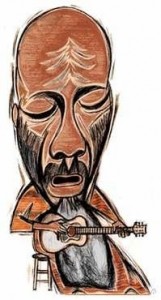R.I.P., Richie Havens
Richie Havens died on April 22, 2013. I interviewed him for a story that ran in the Cape Cod Times on Nov. 19, 2001.
Still singing for freedom
It’s been more than 30 years, so you might think Richie Havens would be tired of talking about Woodstock.
“Oh, no, not at all,” says the folk singer, who performs Saturday in Provincetown
“I’ve come to learn that it didn’t belong to me in the first place. It belongs to everyone,” he says of the song he first performed as an extemporaneous variation on the traditional spiritual “Motherless Child.” He delivered it as part of his festival-opening performance on July 16, 1969. “It came out of me and came through me, without my knowledge that I was going to sing that.”
Havens was supposed to be the fifth performer to take the stage for that celebration of peace and love. But the scheduled start time was four hours in the past and the concert promoters were begging Havens to perform.
Why him? The crowd was so much larger than anticipated that musicians had to be flown to the stage by helicopter from a nearby farm. Since Havens and his band had the smallest pile of instruments, they were pushed to the head of the line.
When he got to the stage in Bethel, N.Y., Havens looked out at the faces – hundreds of thousands of faces.
One thought passed through his mind: “Gosh, they’re going to throw stuff at me.”
Scheduled to play for 20 minutes, Havens gave the promoters some breathing room to get their act together (more or less) by performing for three hours. When he ran out of material, he just made up a song. That song, “Freedom,” became one of the highlights of the Woodstock film.
“I had nothing else to sing, and it just came together,” he says during a phone call from West Palm Beach, Fla., where he was scheduled to perform with Judy Collins, Roger McGuinn and Janis Ian – the same lineup that performed at the Melody Tent in Hyannis in August.
“There hasn’t been a country I’ve been to where that song wasn’t what the people wanted to hear.”
Havens, 60, says that the Woodstock crowd was even larger than “official” estimates.
“The numbers, believe it or not, were 520,000 people the first day. The newspaper said 250,000. They do that to everything they fear. They halve it so people think it’s less than it is.
“In the film, when the camera is behind me and you see people starting to stand and clap, most people don’t realize that there is another field over the top of that hill almost as big as the field you’re looking at. That field was filled as well. They never even saw the stage.
“When I flew over them, the first thing that came to mind was what became the title of my book: ‘They can’t hide us anymore.'” (The memoir was released in 1999.)
Havens says the lessons from Woodstock still matter.
“It was the most peaceful thing, the most conscious thing, that had happened with that many people in this country. As young people, we had been put upon by our own government in a way that made us very afraid.
“All we wanted to be was real Americans. We wanted to work with other people and negotiate, rather than fight with them. We knew it wasn’t the people’s fault that there was war. It’s never the people’s fault. It’s always the government.
“It’s up to us to say what really happens.
“A lot of the young people I talk to want to know what the ’60s were about. It wasn’t about music. It was about consciousness being put through the music of a generation. That consciousness became world consciousness. World peace was what my whole generation was about.”
Of course, Havens’ career didn’t begin or end with Woodstock. His latest CD, “Wishing Well,” will be released tomorrow. Along with some Havens originals, it includes a cover of Pink Floyd’s “On the Turning Away.”
Born in Brooklyn, Havens organized several street-corner doo-wop groups when he was a teenager, but his first performances were in a less visible place.
“We had wonderful parks in Brooklyn,” he says. “I spent a lot of time in the tops of trees with my friends, just getting away from the cement. We weren’t basketball players, which is why we turned into singers in the trees. The doo-wop thing was our way of expressing community.”
When he was 20, Havens plunged into the Greenwich Village folk scene. The first two albums he recorded weren’t released at the time. “Mixed Bag,” a 1967 album that featured covers of songs by Bob Dylan and the Beatles, pushed him to the folk foreground.
After Woodstock, Havens had the audience to stay on the road nearly full time and the clout to push social causes.
In the ’70s, he co-founded a children’s oceanographic museum in the Bronx. In 1990, he founded the Natural Guard, a children’s environmental-action organization with chapters around the world. “It’s run by the kids themselves,” Havens says. “Kids have the answers to the big questions on this planet.”
Havens has worked on other peace and justice causes over the years. Saturday’s concert is a benefit for the Leonard Peltier Defense Committee (www.freepeltier.org). Peltier is serving consecutive life sentences for the murder of two FBI agents on the Pine Ridge Indian Reservation in South Dakota in 1975. Peltier maintains he was not the killer, and many activists feel he was not granted a fair trial.
Havens sees much still to be done, but is quick to point out that the world has seen some changes for the better since the Woodstock era.
“Over the last 30 years, we have changed so much and we haven’t even acknowledged it,” he says. “We haven’t patted ourselves on the back for surviving the craziness that the world throws on us.”

